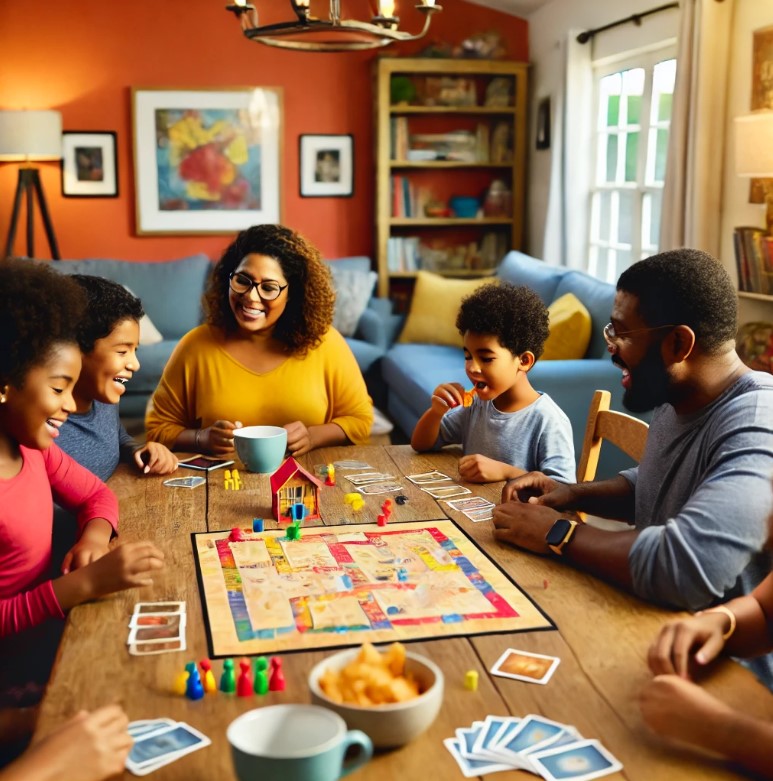
In an age dominated by digital screens and virtual interactions, the humble board game might seem like a relic of the past. However, its enduring appeal lies not just in its entertainment value but in its ability to foster meaningful connections and promote well-being within families, especially among teenagers. Here’s how board games can play a crucial role in creating stronger family bonds and contributing to the happiness of teens.
1. Quality Time and Bonding
Board games provide a dedicated space for families to come together and interact without the distractions of smartphones or television. Whether it’s a competitive round of Monopoly or a cooperative strategy game like Pandemic, these activities encourage face-to-face communication and teamwork. Parents and teens alike can engage in friendly banter, strategize together, and celebrate victories or learn from defeats as a unified team. This shared experience builds trust and strengthens the emotional bonds between family members.
2. Building Communication Skills
Effective communication is essential for healthy relationships, and board games offer a structured environment where family members can practice this skill in a relaxed setting. Games often require players to discuss strategies, negotiate deals, and express their thoughts clearly. For teens, who may sometimes find it challenging to communicate openly with their parents, these games provide a natural platform to voice their opinions and ideas without pressure. Over time, improved communication during gameplay can spill over into everyday conversations, fostering more meaningful exchanges and mutual understanding within the family.
3. Learning Through Play
Many board games are designed to be educational, incorporating elements of math, logic, problem-solving, and critical thinking. For teens, these games offer a fun way to sharpen cognitive skills and improve academic performance without feeling like traditional learning. Games like Scrabble encourage vocabulary expansion, while chess enhances strategic thinking and planning. By engaging in these mentally stimulating activities with their families, teens not only gain knowledge but also develop a positive attitude towards learning, seeing it as an enjoyable and rewarding experience.
4. Stress Relief and Emotional Well-being
Playing board games can be an effective stress reliever for both teens and their parents. The structured nature of gameplay, combined with the element of fun and competition, helps release endorphins—the body’s natural mood boosters. This can reduce feelings of anxiety and promote relaxation, fostering a more positive atmosphere at home. Moreover, the laughter and shared enjoyment that often accompany game sessions create pleasant memories and strengthen the emotional resilience of teens, helping them cope better with the challenges of adolescence.
5. Promoting Social Skills and Sportsmanship
Board games teach valuable social skills such as patience, sportsmanship, and empathy. In a competitive game setting, teens learn to manage their emotions, respect others’ viewpoints, and gracefully accept both victory and defeat. These experiences are invaluable as they navigate friendships, school, and later, professional environments. Learning to play fair, follow rules, and show respect towards opponents are crucial life lessons that board games impart in a non-threatening and enjoyable manner.
6. Cultural and Generational Bridge
Board games often transcend generations and cultural backgrounds, offering a bridge between parents and teens who may have different interests or perspectives. Traditional games from different cultures provide an opportunity for families to explore their heritage and traditions together. Meanwhile, modern board games with innovative themes and mechanics appeal to teens’ curiosity and desire for novelty. This cultural exchange fosters mutual respect and appreciation, enriching family dynamics and creating a sense of unity across generations.
7. Technology Detox
In today’s hyper-connected world, excessive screen time is a common concern for families. Board games offer a welcome break from digital devices, allowing teens to disconnect from virtual worlds and reconnect with the real world and their loved ones. This detoxification from screens encourages healthier habits and improves sleep patterns, contributing to overall well-being.
8. Building Memories and Traditions
The memories created during board game sessions often become cherished family traditions. Whether it’s a weekly game night, a holiday tradition, or a spontaneous game session on a rainy day, these moments form lasting bonds and provide a sense of continuity and stability for teens. As they look back on these experiences in years to come, they will fondly recall the laughter, camaraderie, and joy shared with their family around the game table.
Conclusion
Board games are more than just entertainment; they are powerful tools for building stronger families and nurturing happier teens. By promoting communication, fostering learning, teaching valuable life skills, and creating lasting memories, board games play a crucial role in strengthening family bonds and contributing to the emotional well-being of teens. So, the next time you gather around the table for a game of Risk or Settlers of Catan, remember that you’re not just playing a game—you’re investing in the happiness and resilience of your family.
Invest in board games today and watch your family bond grow stronger with every roll of the dice and move of the piece.

